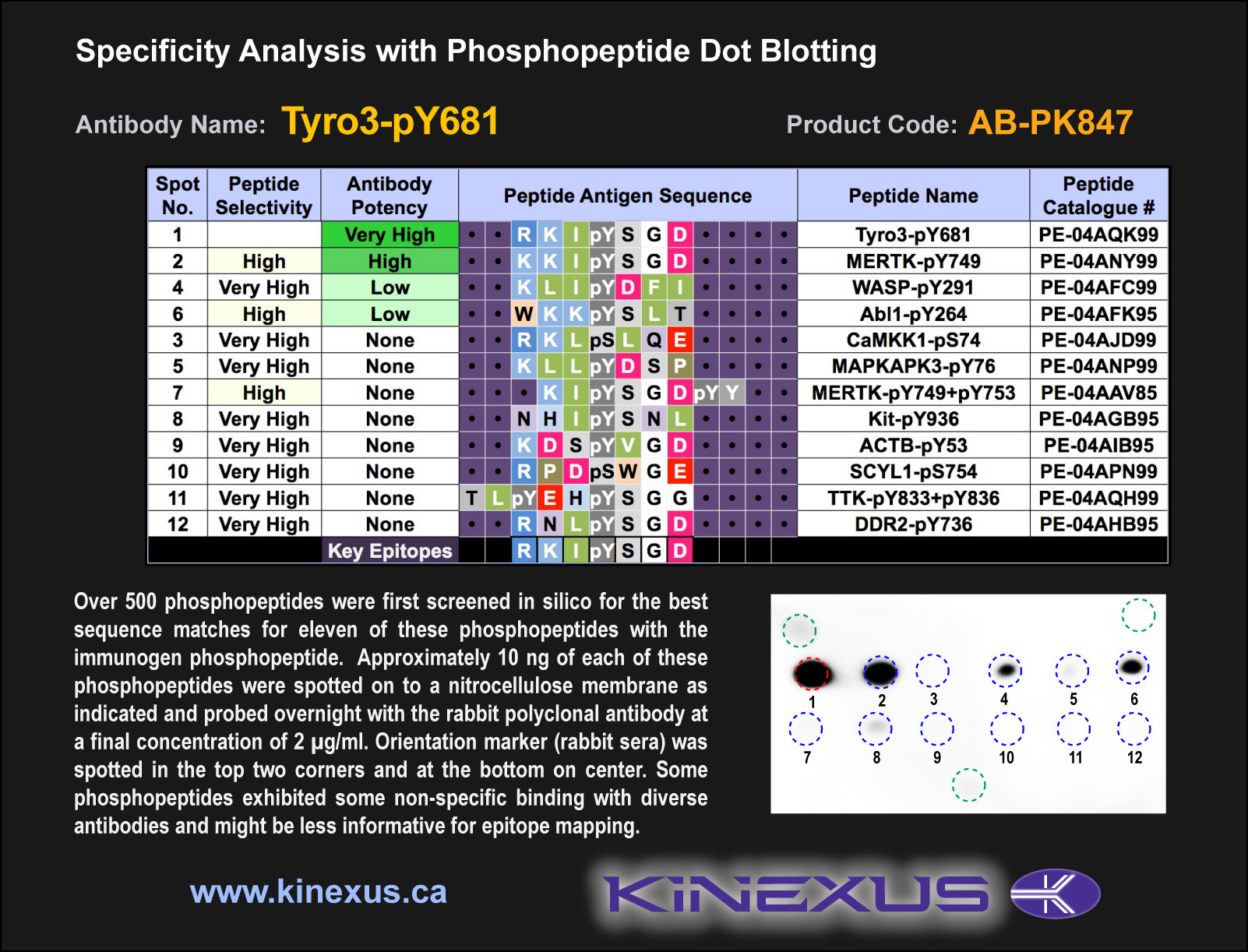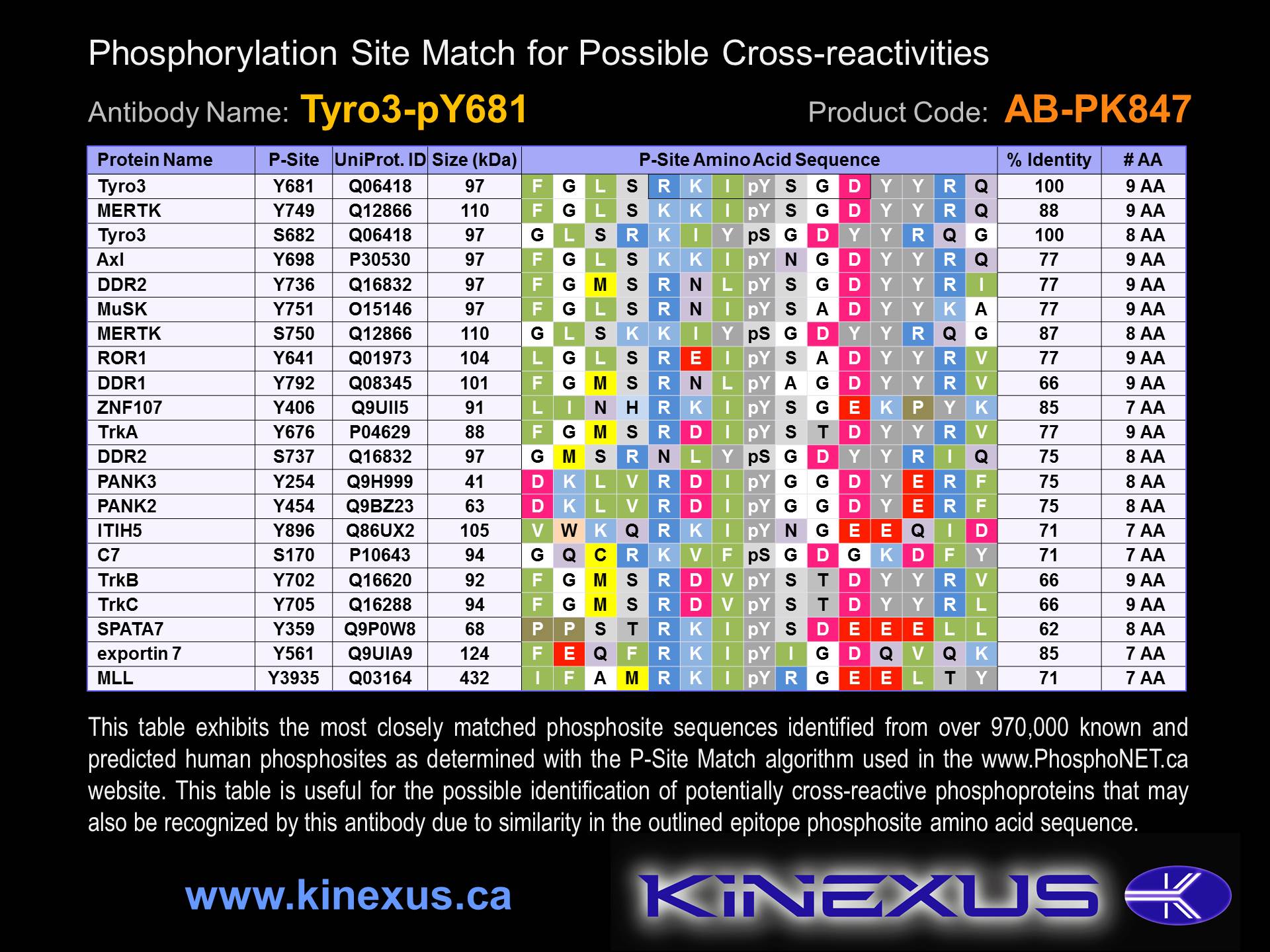Product Name: Tyro3-pY681
Product Number: AB-PK847
| Size: | 25 µg | Price: | 89.00 | |
| $US |
Target Full Name: Tyrosine-protein kinase receptor TYRO3
Target Alias: BYK; DTK; RSE; SKY; Tif; Brt; FLJ16467; CCDS10080.1; ENSG00000092445
Product Type Specific: Protein kinase phosphosite-specific antibody
Antibody Code: PK847
Antibody Target Type: Phosphosite-specific
Antibody Phosphosite: Y681
Protein UniProt: Q06418
Protein SigNET: Q06418
Antibody Type: Polyclonal
Antibody Host Species: Rabbit
Antibody Immunogen Source: Human Tyro3 sequence peptide Cat. No.: PE-04AQK99
Target Alias: BYK; DTK; RSE; SKY; Tif; Brt; FLJ16467; CCDS10080.1; ENSG00000092445
Product Type Specific: Protein kinase phosphosite-specific antibody
Antibody Code: PK847
Antibody Target Type: Phosphosite-specific
Antibody Phosphosite: Y681
Protein UniProt: Q06418
Protein SigNET: Q06418
Antibody Type: Polyclonal
Antibody Host Species: Rabbit
Antibody Immunogen Source: Human Tyro3 sequence peptide Cat. No.: PE-04AQK99
Antibody Immunogen Sequence: RKI(pY)SGD(bA)C
Antibody Immunogen Description: Corresponds to amino acid residues R678 to D684; In the protein kinase catalytic domain activation T loop region between subdomains VII and VIII.
Antibody Immunogen Description: Corresponds to amino acid residues R678 to D684; In the protein kinase catalytic domain activation T loop region between subdomains VII and VIII.
Production Method: The immunizing peptide was produced by solid phase synthesis on a multipep peptide synthesizer and purified by reverse-phase hplc chromatography. Purity was assessed by analytical hplc and the amino acid sequence confirmed by mass spectrometry analysis. This peptide was coupled to KLH prior to immunization into rabbits. New Zealand White rabbits were subcutaneously injected with KLH-coupled immunizing peptide every 4 weeks for 4 months. The sera from these animals was applied onto an agarose column to which the immunogen peptide was thio-linked. Antibody was eluted from the column with 0.1 M glycine, pH 2.5. Subsequently, the antibody solution was neutralized to pH 7.0 with saturated Tris.This antibody was also subject to negative purification over phosphotyrosine-agarose.
Antibody Modification: Unconjugated. Contact KInexus if you are interest in having the antibody biotinylated or coupled with fluorescent dyes.
Antibody Modification: Unconjugated. Contact KInexus if you are interest in having the antibody biotinylated or coupled with fluorescent dyes.
Antibody Concentration: 1 mg/ml
Storage Buffer: Phosphate buffered saline pH 7.4, 0.05% Thimerasol
Storage Conditions: For long term storage, keep frozen at -40°C or lower. Stock solution can be kept at +4°C for more than 3 months. Avoid repeated freeze-thaw cycles.
Product Use: Western blotting | Antibody microarray
Antibody Dilution Recommended: 2 µg/ml for immunoblotting
Antibody Potency: Very strong immunoreactivity with immunogen peptide on dot blots.
Antibody Species Reactivity: Human
Antibody Positive Control: The observed molecular mass of the processed target protein on SDS-PAGE gels is reported to be around 95-110 kDa.
Storage Buffer: Phosphate buffered saline pH 7.4, 0.05% Thimerasol
Storage Conditions: For long term storage, keep frozen at -40°C or lower. Stock solution can be kept at +4°C for more than 3 months. Avoid repeated freeze-thaw cycles.
Product Use: Western blotting | Antibody microarray
Antibody Dilution Recommended: 2 µg/ml for immunoblotting
Antibody Potency: Very strong immunoreactivity with immunogen peptide on dot blots.
Antibody Species Reactivity: Human
Antibody Positive Control: The observed molecular mass of the processed target protein on SDS-PAGE gels is reported to be around 95-110 kDa.
Related Product 1: Tyro3-pY681 blocking peptide
Related Product 2: Tyro3-pY685+pY686 phosphosite-specific antibody (Cat. No.: AB-PK848)
Related Product 2: Tyro3-pY685+pY686 phosphosite-specific antibody (Cat. No.: AB-PK848)
Scientific Background: Tyro3 is one of several protein kinases that can phosphorylate KinSub2DDDYF. Tyro3 is a receptor protein-tyrosine kinase of the TK group and Axl family. It responds to TUB, TULP1, GAS6 and protein S as ligands and regulates cell survival, proliferation, immunoregulation, phagocytosis, cell migration, actin organization, spermatogenesis, platelet aggregation, clot stabilization, memory formation, circadian rhythm and synaptic plasticity. This kinase is moderate to highly expressed in most tested human tissues; it is expressed in the brain (where it is involved in the protection of neurons from apoptosis), expressed in lymphoid, vascular and reproductive tissue and in primary and tumour cell lines. Tyro3 interacts with GAS6. Tyro3 together with AXL and MER form the AXL/Tyro3 family of receptor-tyrosine kinases. Members of this family play an essential role in spermatogenesis, immunoregulation, and phagocytosis. In addition to signal transduction, Tyro3 participates in cell adhesion. Gas6, a product of growth arrest-specific gene, activates the kinase activity of all three receptors. Signalling transduction can occur via MAPK/ERK and Pi3K/Akt pathways. Overexpression in various cancers provide transformative ability and increased survival signals. Tyro3 has been linked with the development of mammary cancer and multiple myelomas. Tyro3 may also be a potential therapeutic target in breast cancer.
Figure 1. Epitope mapping of Tyro3-pY681 antibody with similar phosphopeptides on dot blots.
Figure 2. Identification of phosphosites related to Tyro3-pY681.
© Kinexus Bioinformatics Corporation 2017



